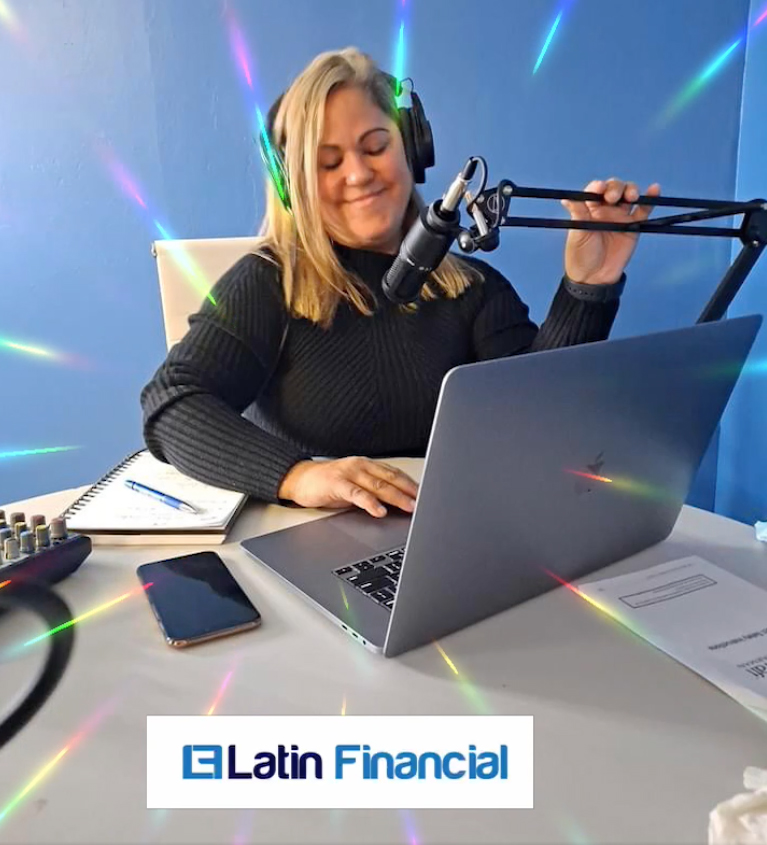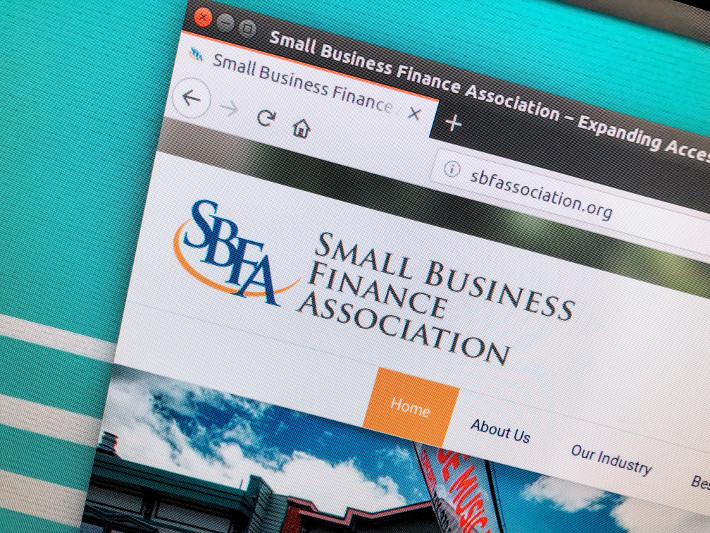Brokers
Latin Financial Launches First Lending Podcast in ‘Spanglish’
February 4, 2022 In an inaugural move for small business financing this week, Latin Financial launched the first ‘Spanglish’ podcast for funders, lenders, merchants, and brokers titled the Latin Financial Podcast. Hosted by the company’s CEO Sonia Alvelo and co-hosted by Underwriter Ruth Alustiza, Latin Financial hopes to create an open forum of discussion and education about how Latino-owned businesses can get access to different types of financial products; all in two different languages.
In an inaugural move for small business financing this week, Latin Financial launched the first ‘Spanglish’ podcast for funders, lenders, merchants, and brokers titled the Latin Financial Podcast. Hosted by the company’s CEO Sonia Alvelo and co-hosted by Underwriter Ruth Alustiza, Latin Financial hopes to create an open forum of discussion and education about how Latino-owned businesses can get access to different types of financial products; all in two different languages.
“It was so much fun, but so scary,” said Alvelo, when asked about her experience recording on her first episode. “[I’m doing this] to make sure the merchants and clients have and will have the right information, I know I’m breaking barriers of languages, it’s the right thing to do.”
While still in its infancy, Alvelo is expecting the show to take off. Her target audience among merchants is a growing group of Latino-owned small businesses who have been historically underbanked. Offering episodes in both English and Spanish, the podcast hopes to not only educate the show’s listeners on how small business lending works, but also hopes to serve as a crash course in either Spanish or English for those who are already members of the non-bank finance world.
The show will have funders, lenders, merchants, and staff of Latin Financial on as guests, according to Alvelo. The show has begun a stream of content that will be released on a regular basis that is being uploaded on platforms like Apple Podcasts, Google Podcasts, and Spotify.
“We are doing one episode per week, said Alvelo. “We’re going to add guests, they are already asking me to attend, and lenders. I’ll be doing back and forth, Spanish and English for sure.”
Alvelo seems confident that the show can separate itself from the countless other finance podcasts that exist. With a dynamic of two languages, two cultures, complex financial products, and revolving guests, it seems as if Latin Financial has discovered a niche in the business media space. “The audience can listen in Spanglish about what we do to help business owners in the United States and Puerto Rico. It’s a new way to stay informed, get educated on updated programs in the financing Industry, all in two languages,” Alvelo said. “It’s Spanish and English, equals Spanglish!”
A weblink to the show can be found here.
As Alternative Finance Leaves NYC, Long Island May Be The Next Best Option
January 26, 2022 As things like cost of rent, remote work, and incoming disclosure laws cause uncertainty in the hub of alternative finance, many in the industry have decided to leave New York City. Some however, say the perception of a mass exodus is false, and it is Long Island that checks all the boxes for alternative finance’s new home.
As things like cost of rent, remote work, and incoming disclosure laws cause uncertainty in the hub of alternative finance, many in the industry have decided to leave New York City. Some however, say the perception of a mass exodus is false, and it is Long Island that checks all the boxes for alternative finance’s new home.
“My company started on Long Island and it’s where most of our staff is from, so logically it made sense to keep it there in the beginning of [our] journey,” said Jared Weitz, CEO of United Capital Source. “It’s close to people’s homes so the commute is less for staff and the office space can be 10 to 40 percent less on cost and your loss factor on space is less so the space you do rent, you actually get to use more of.”
According to Weitz, employees in the industry lost a desire to commute during the pandemic. When transitioning from in-person work to remote and then back to in-person, it seems like a commute to Manhattan was a tough sell.
“During [the pandemic], a ton of larger companies who had massive offices in Manhattan ticked it down,” said Weitz. “Staff also didn’t want to commute anymore and so many offices in the city have either moved out to Long Island or stayed in [New York City] to smaller offices and did [remote work] with employees.”
 When asked about the value of a Downtown Manhattan address on a business card, Weitz abruptly dismissed the notion that names like Wall, Rector, and Pine still hold the same prestige as it did in years past.
When asked about the value of a Downtown Manhattan address on a business card, Weitz abruptly dismissed the notion that names like Wall, Rector, and Pine still hold the same prestige as it did in years past.
“No, no, no, no one looks at that anymore,” Weitz said. “Most often people are focused on client experiences, so reviews online, time in business, online presence, what can be found about them.”
Weitz spoke on the quality of employees that come from the New York area, and how their work ethic and work experience are some of the best the industry has to offer.
“Look, I’m from New York so I’m partial and I can see why people say [this]. New York [workers] have a certain grit, and a certain fight with laser focus determination.”
“I think there are people who are smart and who hustle anywhere,” Weitz continued. “While southerners may have a laid-back lifestyle, I know plenty who hustle hard, [but] I do think you can always tell the difference from a New York sales rep versus another.”
Lenders Love One-Man Broker Shops, Rookie Broker Finds
January 5, 2022 “After meeting so many people at the Broker Fair in New York City, I was like, ‘you know what, now is the time for it. I’m young, so let’s take the risk and start my own company.’”
“After meeting so many people at the Broker Fair in New York City, I was like, ‘you know what, now is the time for it. I’m young, so let’s take the risk and start my own company.’”
Matt Dolecki, a 23-year old entrepreneur who owned and sold two businesses before he graduated high school, is taking the young hustler’s mindset to the alternative finance world. Just this week, Dolecki started his own brokerage; dubbing it Opulent Capital.
Although Dolecki wants to start funding deals immediately and create relationships across the space, he is aware that he needs to also focus on honing in on the foundations of his business if he wants true success.
“I think a lot of people when they enter this space try to grow too fast and too big too quickly,” he said. “I’m not here to grow extremely fast or extremely big. I’m here to establish a well-rounded company and not tarnish my work just trying to grow fast.”
After interning at a funding company after college and subsequently working for a commercial collections agency, Dolecki believes his experience seeing all sides of the process will set him aside from other brokers.
“I have enough knowledge and information for the merchant to not just broker them the deal, but inform the merchant and let them know exactly what they’re getting, what’s possible for them, and what’s the better option,” Dolecki said.
“I have the debt collection side, and I’ve worked in [small business funding], so I have a really well rounded knowledge of how this whole thing works. If someone were to default, I know exactly which way to go. I can guide the lender on exactly which way to go, I have all the contacts on both sides, lenders and brokers, as well as many debt collections agencies. So I can help lenders not only get business, but retain business and get back lost revenue.”
Not only is Dolecki confident that his experience will set him and his company aside from competitors, he also believes his strength in numbers, or lack of, will allow him to operate a smooth show.
“I’m a one man shop,” said Dolecki. “I’ve talked to a lot of lenders, and they like the idea of having one person to deal with. Information is directly to the source, directly to me and directly to the merchant. It’s an easier form of communication. Every lender I’ve talked to agrees that 90% of their best selling ISOs are one man shops.”
When speaking on creating an image for his company from the merchant’s perspective, Dolecki spoke extensively about different types of marketing. He says that a strategy seemingly based on the business owner’s age can determine what type of communication should be used to pitch that particular merchant.
“If you are trying to reach out to small business owners over the age of 60, most likely a call will be more beneficial rather than investing in marketing or SEO,” said Dolecki. “Now there are so many young business owners who all love technology and doing things online, so building a platform where you can use fintech to apply for loans and search different loan options would be much more beneficial to the younger business owners.”
“I think a good mix of using fintech, algorithms, and tech, but also cold calling and [even] reaching out by mail is an effective way of trying to find that perfect mix of using both types of merchants.”
Dolecki has received support from other brokerages in the industry and claims without help, he would never be in the position he is now.
“Shout out to Porsha and Mercedes Brooks at Brooks Partners Finance,” said Dolecki. “They’ve really been a big mentor for me starting out, and helping me to get the ball rolling. I’m now calling merchants, signing on as an ISO with different lenders, and still just getting started.”
Brokers who Utilize Fintech are Here to Stay
December 23, 2021
“I don’t think the industry would really be the same if we didn’t have brokers anymore.”
Dave Stewart, who was recently promoted to Sales and Partnerships Manager at Idea Financial, spoke to deBanked about the role brokers will play in the future of business financing. With so many different kinds of innovation being offered in the financial world through technology, Stewart shared his thoughts on how brokers, funders, and merchants can get the most out of a technology-infused lending environment.
“We think about the whole fintech thing, everything getting technology based, and that there’s a missed opportunity for the human touch,” said Stewart, when asked how technology will influence the way merchants apply for capital. “There’s a lot of clients out there that can go online and fill out an application, but they don’t understand the in’s and out’s.”
“When [the merchant] doesn’t understand how everything actually works, they usually fall back and seek a broker at some point in time.”
Stewart highlighted how from the lender’s perspective, the value of brokers is in being the face to the experience of purchasing a financial product. He described it as someone who can guide the merchant to the right type of financing and then through that specific funding approval process.
“I think there is value in the experience,” said Stewart. “I don’t go to a restaurant to cook my own meal. I go to a restaurant because the service is going to be great, the food is going to be great, and hopefully I have a great experience, and I think that’s a great example of what the broker does.”
Despite believing that the broker’s role in financing is invincible to fintech’s innovation in lending, Stewart didn’t dismiss the value of understanding and leveraging different types of technology in order to be competitive.
“There’s an art to being a good broker,” said Stewart. “There are a lot of people who are not tech savvy and are just monster brokers or monster sales people, but they definitely need or rely on somebody else to explain the technical aspects.”
Broker Fair Achieves Record Setting Ticket Sales to its 2021 Conference
December 1, 2021 Broker Fair has logged a significant achievement, record-setting ticket sales for its 2021 conference. Registrations for the December 6th event have surpassed every single deBanked event since inception. Only pre-show tickets for the night before can still be purchased on the website. No tickets will be available at the event itself.
Broker Fair has logged a significant achievement, record-setting ticket sales for its 2021 conference. Registrations for the December 6th event have surpassed every single deBanked event since inception. Only pre-show tickets for the night before can still be purchased on the website. No tickets will be available at the event itself.
“It’s 2021, so naturally we had tempered some of our expectations internally about registrations for this event,” said Broker Fair founder Sean Murray. “Somehow, we ended up breaking the record for most tickets sold ever. People really want to connect in person. The industry has spoken and we’re eager to see the turnout now.”
The event is being held at Convene at Brookfield Place in lower Manhattan. The agenda is online and attendees can take advantage of the newly launched Certified Small Business Finance Professional course available on site for the first time ever. It’s also possible to connect with fellow attendees ahead of time using the mobile app.
“We’ve got so many great sponsors this year,” said Murray. “I expect a lot of dealmaking to happen in the showcase room.”
Broker Fair Ticket Registration To Shut Off Any Day Now
November 28, 2021 Broker Fair 2021 ticket registration will shut off days before the December 6th event. The broker-centric conference is now officially counting down to its kickoff at Convene in New York City.
Broker Fair 2021 ticket registration will shut off days before the December 6th event. The broker-centric conference is now officially counting down to its kickoff at Convene in New York City.
“This pretty much happens every time we put on a show,” said Broker Fair founder Sean Murray. “Even though this event is post-covid, we’re looking at the number of registrations so far and are very pleasantly surprised.”
Hundreds of small business finance brokers are registered to attend Broker Fair. The annual event first launched in 2018.
“I don’t know what day we’re going to disable registration yet, but based on the pace I’d say there’s no way we make it until Friday,” Murray said.
One on One With Joe Camberato at National Business Capital
May 23, 2021I sat down with Joe Camberato (@GrowByJoe), CEO of National Business Capital in Bohemia, NY. He shared tips about how to run a successful business and gave me a personal tour of his company’s office.
Industry Ponders: Broker Blacklisting, or Certification?
April 5, 2021 It’s a concept that’s been thrown around the industry for years- swapped like business cards at meetups, conventions, and chatrooms. Shouldn’t there be a broker certification, database, or even blacklist for known bad actors?
It’s a concept that’s been thrown around the industry for years- swapped like business cards at meetups, conventions, and chatrooms. Shouldn’t there be a broker certification, database, or even blacklist for known bad actors?
As deBanked petitioned the question, the industry responded with its naturally diverse responses. The problem: bad actors can keep getting away with shenanigans. The solution? Well, no one size fits all approach could work in the alternative finance industry, but a certification source may do the trick.
CEO of FundFi, Efraim “Brian” G. Kandinov, recently brought up the idea of a “Datamerch for Brokers.” Like a DNC list, Kandinov said there has got to be a way to sort out the known bad actors, scam artists, and even the brokers that play the funding houses by training merchants.
“I think opposed to a blacklist: a list that notes bait and switches, where the merchant was coached by the broker,” Kandinov said. “This way can go around a lawsuit or any fear of that, and the funder is free to choose once reading others’ notes.”
Kandinov said that most of his “problem files” show signs of brokers coaching merchants to start protesting deals after the clawback period ends. Get paid, pass the smell test during a 30-60 day waiting period, and then tell the merchant to jump ship on the deal or argue to lower the payments.
“If they were not [suddenly going out of business], they were calling in like a schedule to lower their payments. No way it can be that uniform unless they were being coached. The broker comes off as the good guy that he played the funding houses,” Kandinov said. “I think harsh means are necessary to expel these guys from the industry.”
Other funding side members of the industry have voiced their support for some type of broker record database. Kristen Ferrara, Director of Underwriting at The LCF Group based in New York, said that LCF pays a high expense to select ISOs. A vetting platform could be a great resource.
 “I think it would be a good resource for funders,” Ferrara said. “We turn down about 50% of the ISOs who try to sign up with us. This resource could save funders millions of dollars in deals going bad from ISOs over-promising or committing fraud.”
“I think it would be a good resource for funders,” Ferrara said. “We turn down about 50% of the ISOs who try to sign up with us. This resource could save funders millions of dollars in deals going bad from ISOs over-promising or committing fraud.”
On the other side of the country in San Diego, CEO David Leibowitz from Mulligan Funding said he is all for a way to help funders vet brokers. Mulligan is lucky to work with a trusted brokers network and drops a client like a broken elevator at the first sign of fraud or unethical behavior, he said.
“We are extremely careful about which brokers we do business with. If we see any kind of practice that we think is unethical, we’ll cut a broker loose in a heartbeat,” Leibowitz said. “Is there value in the sort of thing you’re talking about? I think there probably is because I think it makes vetting brokers for [funders] a lot easier, and it also allows brokers to differentiate themselves against their competition by their ethics.”
Leibowitz is a proponent of ethics as an indicator of value and said a certification could help members of the public tell the difference between good and bad funders and let funders spot good ISOs and bad ISOs.
A worry for some is that whatever company, organization, or site that hosts a broker ledger could face lawsuits for liability, could accept payments to make bad reviews go away, list competitors to hurt them, or be outright ignored by an industry always hungry for deals.
But industry lawyers seem to agree that a broker certification or blacklist would ultimately benefit the industry if provided from the right source. Patrick Siegfried, the Deputy General Counsel at Rapid Finance, said that whatever agency would be rating brokers would need its own trusted reputation.
“To have a legitimate background or rating system, it needs to be done by an independent third-party that has its own credentials,” Siegfried said. “I think that’s a big reason you don’t see many third-party or private rating systems.”
 Siegfried said one option that ensures a true third-party point of view is a government agency taking care of a broker tracking system. Another option would be an industry coalition, but then it’s a question of cost- Who is paying to staff and maintain a complaint system?
Siegfried said one option that ensures a true third-party point of view is a government agency taking care of a broker tracking system. Another option would be an industry coalition, but then it’s a question of cost- Who is paying to staff and maintain a complaint system?
“At the end of the day, having a good industry regulator is a benefit for the industry,” Siegfried said. “It will allow a third-party, government entity to vet brokers in terms of licensing and then maintenance, looking into valid complaints.”
As conversations across the country point toward a licensing regime, Siegfried said it’s a sign the industry is maturing and that one day there will be a government agency to lodge complaints with and to actually vet brokers in the space.
Steve Denis from the Small Business Finance Association (SBFA) proposed a solution to the issue. He said that in the works right now is an SBFA-sponsored certification program.
“We started just looking at brokers and thinking about how to certify them,” Denis said. “We think that it’s the time, from the feedback we’ve gotten from regulators, that we launch a true industry-wide certification.”
In the coming months, brokers may be able to apply for certification when the program rolls out. Instead of a ‘blacklist,’ Denis said brokers could set themselves apart as trusted providers by going through a basic background test or industry knowledge checks.
“If you’re a broker and you can’t get certified, then there’s probably some issues,” He said. “So our hope is if you carry a certification, that’s sort of a message that you are a good broker.”
When it comes to government regulation, Denis said he is still cautious. While he 100% expects certification programs to crop up for state licenses, he thinks no government agency can achieve what an industry coalition can do.





























